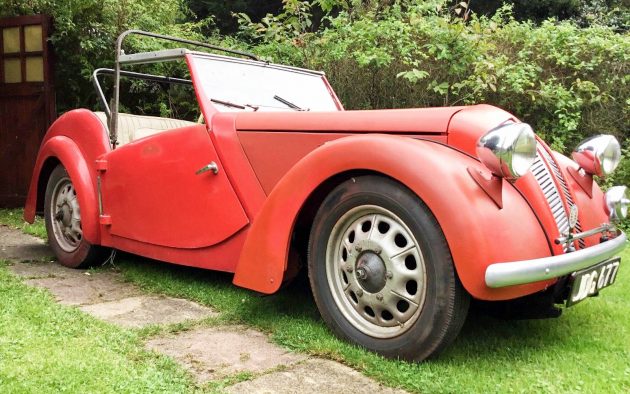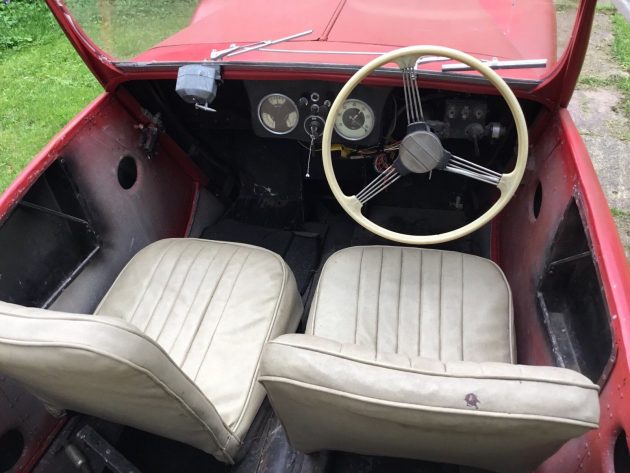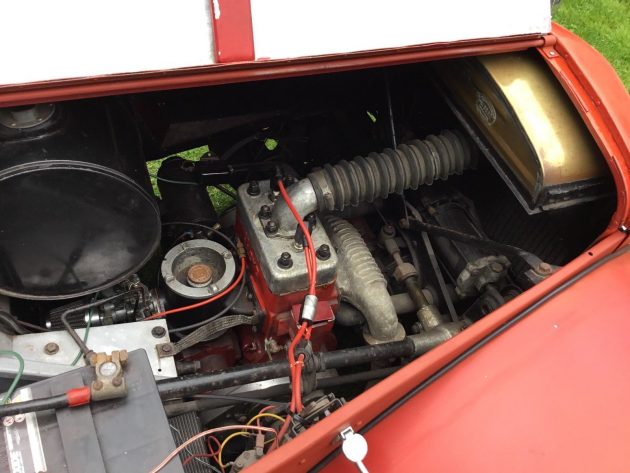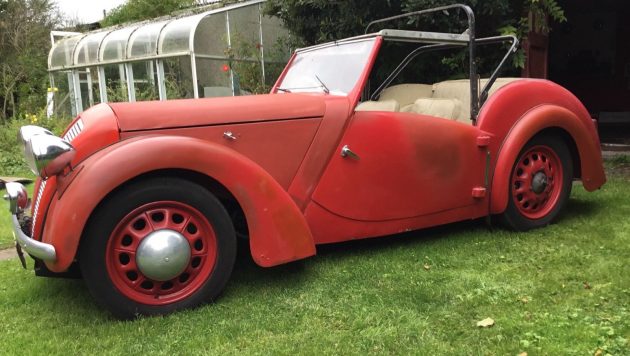You never know what you’ll find listed on eBay. Here’s a rare old car, a Lloyd, one of only 15 known to have survived. If you had to guess, the pattern on the grill and the headlights might remind you of a Citroen 2CV. There’s a strange little Villiers 25 HP 650 CC 2 stroke engine up front powering the front wheels. It has some really advanced features for its time, like rack and pinion steering, a 4-speed transmission with synchromesh in every gear including reverse and it’s sort of fuel injected. Instead of shock absorbers, the springs are enclosed in oil. The body is aluminum. This Lloyd is in Bristol, the United Kingdom with a price of £12,500.00, or a little less than $17,000. It is almost complete and runs and drives but in need of complete restoration. Many extra parts are included. Special thanks to Paul C for the tip!
The interior could use door cards and something on the floor. The top and frame are included, but the old top is only good for a pattern. You’ll need a passenger on rainy days to operate the wipers.
Here’s that strange Villers engine, a 2 stroke water cooled 25 HP engine. It has a wet sump unlike other 2 stroke engines and a pump between the engine and the carburetor. It has ports that line up with ports in the cylinders to directly inject fuel on the compression stroke. Villers manufactured millions of two and four stroke engines from 1912 until 1978. They were used on early lawn mowers in the 1920s as well as many English motorcycles, including the Triumph Norton. There’s a really interesting article on Villers on this history website.
The Lloyd has a reputation for being slow and handled very poorly. It’s hard to imagine how the handling could be poor by 1950s standards. It would be interesting to make this little car drivable and see if it’s as bad as they say. There was a really interesting article on the history of the Lloyd in the Telegraph on November 29th titled “So Long and Thanks for the Fish” (perhaps referring to the song “So long and thanks for all the fish” from the movie “The Hitchhiker’s Guide to the Galaxy”). I think we can agree that this is a project none of us would like to take on. It is a look into automotive history, at what one tinkerer who wanted to build an inexpensive car could do.









Too bad 15 survived.$17 grand?Another English laugh.
@ Mlaw, why is it an ‘English laugh’? Find another one for sale anywhere in the World? It is worth the same as any other car on the planet, which is, ‘whatever someone is willing to pay for it’, and naturally that answer varies between those who may be interested in buying it.
Oh, I’m sorry I was under the impression that I was entitled to my personal opinion,foolish me.I bow to your superiority.ff
A great little car I would love to have. The Villers engines were very reliable and the car weighs almost nothing. Too bad so few have survived.
Perfect movie car for either Laurel or Hardy in their day.
Cool car but my lawnmower has 25 horse power …
is this made by the german Lloyd company, part of the Borgward group?
@Michael Roehrs, no, different company. This car was made by a British guy, ‘Roland Lloyd’.
No, just that the name is the same. These were built on very small scale by an Englishman called Lloyd in post-war optimism. The concept and basics are not too bad, but the project failed. James HGF below has posted a good summary.
“Goodbye and thanks for all the fish” is indeed from “Hitchhiker´s Guide to the Galaxy”. In this context, it must refer to the town of Grimsby, where the car was made. At that time, the largest fishing port in Europe, Grimsby has been in perpetual decline ever since. Prime Brexit territory.
@ Barnfinds – Unfortunately this write up is sorely in need of a re-write to correct the egregious error claiming that the LLoyd 650 is powered by a Villiers’ engine. That appears more than once in the text. Nor is their any value to include a smidgen of Villiers history which only enhances the the false claim that Lloyd of Grimsby used a Villiers engine in the 650.
The Lloyd was powered by a bespoke engine of 654cc and though obviously not a renowned success it was a unique Roland Lloyd technological tour de force whereas a more conventional vehicle assembled with “off the shelf” components might have fared better. See Dellow as an example of a small manufacturer opting for a limited market with machines that are sought after by enthusiasts today.
The sellers eBay text makes it obvious that this is not only powered by a unique engine, but that two partial engines and parts comprise part of the offer @ £12,500.
Attached is a post from Unique Cars and Parts dot com in Australia with has an in depth explanation of the Lloyd 650 engine (do read it!) and other design details:
https://www.uniquecarsandparts.com.au/car_info_lloyd_650.php
ps: the Citroen 2CV of 1955 vintage had a 375cc 9hp engine or 425cc 12hp engine – 2CV A & 2CV AZ respectively.
@James, it would appear you posted your information as I was typing mine. Glad I’m not the only one who didn’t appreciate the errors, despite all the correct answers actually being in the actual eBay listing
@David Frank, some of your information above is not quite correct. This car does not have the Villiers engine. This car has a ‘Lloyd’ engine, developed by Roland Lloyd himself, the inventor and builder of this car. Lloyds original car, the 350, did use the Villiers engine, but not the 650 model which Lloyd developed during the War as stated in the eBay ad. Also stated in the eBay ad, is that this car IS complete, and all parts are included, just not all are fitted. It is NOT a full restoration project unless someone wanted it to be. The car runs and drives well (for what it is and as well as these ever did) and could be driven today. It is suggested the car should have a mechanical recommissioning due to being off the road for some years, which is a basic and sensible precaution to take. It is a rock solid car and totally rot free from the chassis right through to all body panels. It is one of only 8 believed to be left now, the information found on various websites of there being 15 left is outdated, and the figure is now strongly believed to be only 8, with only 3 (including this one) in a drivable condition. Im not sure David, why you would say ‘I think we can agree this is a project none of us would like to take on’? No, I personally would not agree with that statement, and I’m sure many others would too. There is an owner/enthusiast for every make and model of car out there, regardless of what it is, and it would appear in many cases, regardless of what condition it may be in too. So I find it odd to make such a bold statement such as ‘I think we can agree this is a project none of us would like to take on’, on a Barn Finds page of all places, where many enthusiasts on a daily basis from all over the World, myself included, take on cars in a much much worse condition than the one advertised, and make them great again. The Lloyd advertised is in fact a very very easy project, that can be used and enjoyed pretty much straightaway and improved upon whilst using it, and it is highly unlikely you will find anyone else with one at your next car show.
Well said, Liam.
Me thinks the writers at Barnfinds strive to be humourous (not!) and impart their own prejudices on these rare vehicles.
Rather than just stating the facts.
Just sayin…..
I would love to have it.
This is a cool little car and I would love to have it too.
I have an old Motor magazine that has a road test on these, a neat car I’d like to have. But slow and poor handling? What car in the 50’s had good handling? A Nissan Versa would run rings around an XK Jag today.
Our fleet cars are Versa’s….they not so good with a load….
As for these little gem…it’s English and I like it just because it looks good and it’s unique. Priced fairly for the rarity….heck….it looks good just sitting there !
Amazing – a car i’ve never heard of, altho I actually had a Goliath which is related to the German Lloyd Alexander car with parallel twin, OHC engine driving the front wheels in a very compact powertrain. This car shows some very interesting engineering and I’d love to have it. As for handling, for a 1950 car, it was probably reasonably good for the day.
Now the next car I’d like to see here on BF or BAT is a Brutsch.
Say what?
Ken, how about a Rohr? I grew up near Manassas Virginia where a fella named Rohr showcased one of these cars. I’ve actually seen a crude diecast model of one of them. But you’ll never see one at a car show in the States.
I’d be surprised if the handling were as awful as is being implied. It’s a low-powered, FWD car that could probably scrabble around corners pretty nicely. Its simple, appears to be in good shape, and parts aside looks like it could be easy to work on. I’d love to have it.
On seeing this car I went straight to my Catalogue of British Cars which has every car made in the UK between 1895 -1975. Well, it is mentioned, a whole paragraph together with the earlier Lloyd 350, but no photo.
Quote,,
‘” In some respects it was well ahead of its time, employing front-wheel drive and independent suspension all round by means of coil springs. “”
Just want to thank the previous comment providers for their input, a good read.
Thx.
John, wish I had your book – what does it say about the Brutsch and Rohr?
Thanks!
Ken
My reference book only covers British Cars.
This is my Lloyd 350
1939 lloyd 350
Nice Mark! Which country are you in?
Thanks Liam I’m in surrey
Mark, is that something you are considering selling? Im the one selling the 650 above that this post is about…
Hi, is this still for sale Liam?
Hi are you still after or know anyone after a lloyd 650 i have one basket case but very nearly 2 cars
Hi Mel, maybe. Please send me the details if possible. [email protected]
Yes DavidS, this sold back in December 👍
Hey Liam,
My father had a Lloyd 650 as his first car which would have been around probably 1957/58 or thereabouts.
I would love to see the Lloyd if you know where it has gone or if it is going to be at a show.
As I remember he had told me that the wheel had cracked and that he had fixed it with Araldite.
I also recall one trip in it from Croydon to Newhaven where we had to keep stopping for some reason and by the time we got to Lewes it was getting late so we gave up and put up in a B&B – which was a great adventure. I don’t think we ever got to Newhaven but we did at least get back!
Next car was a Wolseley 1500. Altogether a much better proposition.
To me the Lloyd seemed large (I would have been around 4 or 5 at the time) and it was a novelty in the close as not many people had cars.
I distinctly remember the canvas canopy roof. I see now it was actually pretty small although it would have been a step up from a motorbike and sidecar which was all we had before.
If you have any news I’d be please to hear.
Hi Mike, this car went ‘home’! IE, back to the same town it was built in and now literally located around the corner from where the old Lloyd factory was located. The new owner planned a full rebuild of the car. I have not spoken with him since
he bought it, but will reach out to him to check on its progress. If I hear anything, I will post it here 👍
If you come to Sweden i will give you a ride. I wellcome visitors to Hagstad 30km south the town Växjö in the south of Sweden
Jan-E.
There is one Lloyd 650 in Sweden. Have a look
Have a look
Workmate had one of these in Dagenham mid 50’s for a joke we put onto a pile of rubbish with a forklift, happy days